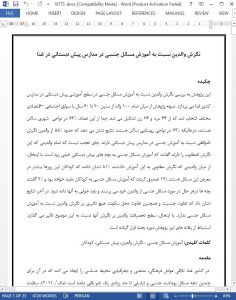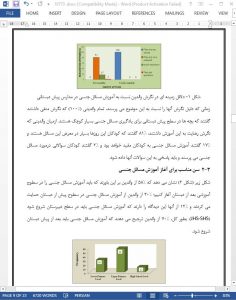Abstract
This study investigates parental attitude towards sex education at the lower primary level of education in Ghana. In all 100 parents ranging from 20 to 60 years, with diverse socio-economic backgrounds consisting of 64 males and 36 females where sampled for the study. Out of this number, 63% reside in urban areas, whereas 37% reside in rural areas. The results indicate that about 58% of parents have an unfavourable attitude towards sex education in lower primary schools. Unsurprisingly, all the parents who held unfavourable attitude towards sex education said that children are too young for sex education at the lower primary school level. However, of the parents who held favourable attitude; 81% indicated that children are exposed a lot these days. 17% admitted that sex education will be helpful to the children and 2% said children ask questions about sex anyway and needed to be provided with answers. Finally, the results showed that there is no gender difference in parental attitude towards sex education, as well as no residency difference about sex education. However, there was a difference in parental attitude in connection to their educational level. The implications of the findings from this research are discussed.
1. Introduction
In Ghana, a confluence of cultural, religious and geographical factors creates a sensitive environment where issues of sexual and reproductive health have remained highly a taboo for decades (Mack, 2011). Sexual health is an important determinant of productivity and national development everywhere. Yet, the mere mention of “Sex” seems to evoke itchy feelings among both the young and old. Adults in the Ghanaian Society have usually refrained from discussing sexual matters with the young. Traditionally, children are brought up with strict discipline and fear and are punished for questioning their parents, especially the girls (Brocato & Dwamena- Aboagye, 2007). Consequently, young people are afraid to ask questions relating to sexual issues as they would be seen as “disrespectful” and “disobedient-” sexual issues are seen as topics for adult discussions only.
5. Conclusion
The study has provided an empirical basis, and not societal opinion about the attitude of Ghanaian parents towards sex education at the lower primary level of schooling. As in many areas of research, the area of sex education is particularly important to national progress. As an aspect of development, denying its relevance in society will be counterproductive. Education of all sorts should be beneficial to the individual who is being educated and should in many ways bring a positive impact to the community and the society at large.
Obviously, sex is a sensitive topic in our society and we must make sure that parents are involved in the dialogue on sex; especially the age sex education should start in school. Although the study has brought to the fore that parents do not subscribe to sex education at the lower elementary school level, they nonetheless favour sex education at the upper primary level. This therefore underscores the relevance of sex education to parents in the country.










